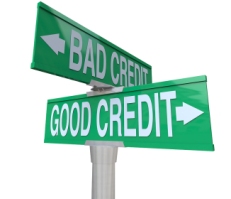Keeping a Good Credit Score – Tips to Improve Credit Score
 Keeping a good credit score is really quite simple, and is certainly a lot easier than fixing an already damaged credit score.
Keeping a good credit score is really quite simple, and is certainly a lot easier than fixing an already damaged credit score.If you already have a good credit score, you probably know that it takes time to build good credit. It may take up to two years and at least three different types of credit to establish a good credit score.
Fixing bad credit, on the other hand, takes much more time and effort, as negative information remains up to 7-1/2 years on your report and continues to impact your credit score.
Letting your credit score deteriorate may prove to be a major mistake.
How to Maintain Good Credit
Follow these tips to improve credit score and maintain it in good condition:
Keeping a Good Credit Score Do’s
- Pay your statements on time. A single late payment can lower your score by up to 50 points, and will remain on your credit report for a long time.
- Keep using credit moderately. You need to keep a steady on-time payments sequence.
- Check and monitor your credit report regularly. Pull your free annual credit report and check it.
- If you’ve missed a payment, get current and stay current. The sooner you can begin to manage your credit and pay on time, the sooner you will see your credit score improve.
- Pay your bills on time. Utility bills, Cellular, Medical, Rent and many more don’t generally show up on your credit report if you’re in good standing, but will show up as a blemish once they go to collection agencies or are sold to others.
- Keep your credit card balances low – at least below 50% of your credit limit, and preferably below 35%. If you cannot pay the balance at the end of the month, don’t keep charging up until you’re able to pay them.
- Re-establish good credit, especially if you’ve had problems in the past. Getting back on track and showing the world that you are worthy of credit will raise your score in the long run. If you have less than 3 active accounts – apply for a secured credit card or a secured loan. Use them responsively and make your payments on time. See Building Credit History for more information.
- Do your rate shopping for a loan within a focused period of time. FICO has a built-in mechanism that disables any bad impact of multiple hard inquiries because of rate shopping made in a defined time period (45 days).
Keeping a Good Credit Score Don’ts
- Don’t max your cards. Keep your credit balance below 35% of your limit.
- Don’t carry credit on your card. Keeping a Good Credit Score requires credit usage, but “Using credit” is not the same as “carrying a balance on your credit cards.” Carrying a balance is expensive, bad for your finances and completely unnecessary. Always pay your statements in full and avoid unnecessary high interest rates.
- Don’t open a bunch of credit cards or accounts that you don’t need and probably won’t use. For example, don’t open a lot of store credit cards just to get the initial 10% discount.
- Don’t close old, paid-off accounts. Contrary to what you may have heard, closing old accounts shortens your credit history and lowers your score.
- Don’t close unused credit cards as a short-term strategy to raise your FICO score. This approach could backfire and actually lower your FICO score because it lowers your credit limit, making your balance-to-limit ratio go up and impacting your score. Only do this as a long-term strategy of reducing debts, and not if you’re planning to take a loan in the next 6 month.
- Pay off debt rather than moving it around. Once again, transferring balance from one credit card to another and closing the other card reduces you available limit, increases your balance-to-limit ration and lowering your score.
- Don’t open a lot of new accounts over a short period of time, especially if your credit report is still thin.
- Don’t transfer credit card balances from one card to another with a lower rate. It’s better to simply pay them down and gradually pay them off.
- Don’t take credit just because you can. Credit is a useful tool, but it can also get you in trouble. If you have good credit, you are probably inundated with offers. Banks, credit card companies and others want to lend you money because they know you’re a good borrower. Even responding to such offer may trigger a hard inquiry to your credit report and ding your credit score. Only respond if it truly benefits you.
- Avoid bankruptcy. Declaring bankruptcy is one of the worst things you can do to your credit score. It may seem like the easy way out in the short term, but in the long run it will cost you much more in high interest rates and payments.
Remember – it may take you 7-1/2 years to recover from a single mistake. Keeping a good credit score is a lot easier than re-building your credit after it sustained a hit.
Return from Keeping a Good Credit Score to How to Repair Bad Credit Page
Return from Keeping a Good Credit Score to Credit Report 101 Home Page
